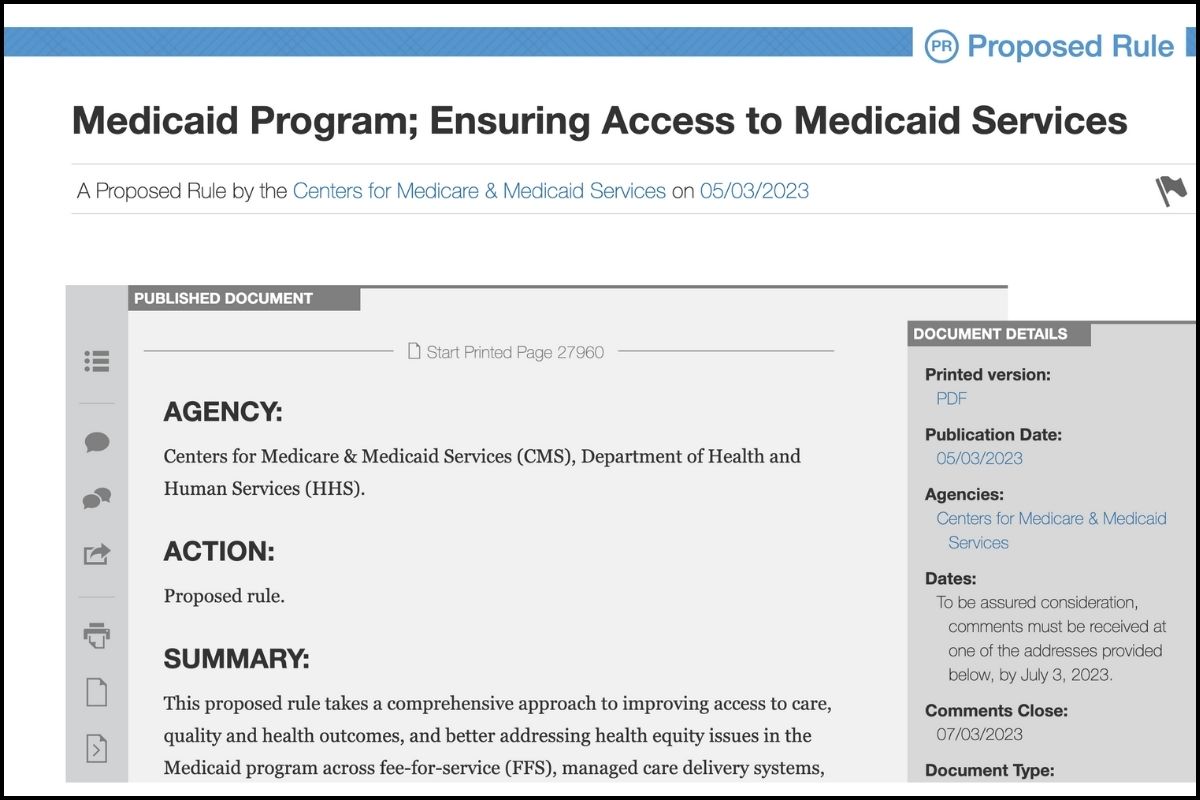The Centers for Medicare & Medicaid Services (CMS) at the U.S. Department of Health and Human Services (HHS) oversees how states run their Medicaid programs. Occasionally, CMS proposes new rules to improve how Medicaid functions. Before new rules are adopted, CMS puts them out for public comment. CMS issued a new rule about ensuring access to care on May 3, 2023.
We appreciate that CMS includes this statement toward the beginning of the proposed rule: “We have concluded that beneficiary perspectives need to be central to operating a high-quality health coverage program that consistently meets the needs of all its beneficiaries.”
The rule covers these areas:
Advisory Committees: This section describes two new committees that replace currently required Medicaid Medical Care Advisory Committees: a Medicaid Advisory Committee (MAC) and a Beneficiary Advisory Group (BAG). The MAC would advise the Division of Medicaid on a broader range of issues than the current advisory committee does. At least 25% of the members of the MAC must be Medicaid beneficiaries. Beneficiaries comprise the BAG and advise the MAC.
Home and Community-Based Services: This section emphasizes compliance with the Americans with Disabilities Act and the Olmstead ruling to ensure access to community-based care.
Critical Incidents: The rule requires the state to establish a minimum standard definition of a critical incident and ways to report incidents.
Access Reporting: The rule requires states to annually report how they maintain waiting lists for home and community-based waiver services.
Payment Adequacy: The rule requires states to report on the percentage of payment services for homemaker, home health and personal aide services that pay the direct care workers who provide these services.
Families as Allies submitted these public comments:
“I am submitting these comments on behalf of Families as Allies, a statewide organization in Mississippi run by and for families of children with behavioral health and related challenges. We are the SAMHSA-designated Statewide Family Network for Children’sChildren’s Mental Health and the Family-to-Family Health Information Center for Mississippi. Many of the families in our organization have children who are Medicaid beneficiaries.
We appreciate the overall tone and direction of this policy, especially that it is patient and family-centered, and we urge all of the changes it recommends be adopted.
A. Medicaid Advisory Committee and Beneficiary Advisory Group (§ 431.12) – We especially appreciate and agree with recommendations regarding changes to the Medicaid Medical Care Advisory Committee and the formation of the Medicaid Advisory Committee (MAC) and the associated Beneficiary Advisory Group (BAG). We believe these two new groups and their proposed structure and composition have tremendous potential to improve the outcomes and cost effectiveness of Medicaid-funded services. We recommend that states work with peer and family run organizations and grassroots groups who are already engaged with different groups of Medicaid beneficiaries to develop the policies and procedures for these groups and to engage a representative and diverse group of beneficiaries from the very beginning. We also recommend that the appointment process of beneficiaries to these committees be done in partnership with these same groups. We also urge that lobbyists for healthcare agencies that receive Medicaid dollars refrain from lobbying state legislators about topics before the MAC specifically and about Medicaid-policy issues in general.
We recommend that non-beneficiary members of the MAC be required to disclose on the MAC public website if they are registered lobbyists, and, if so, for whom. We also recommend that states enact conflict of interest policies for MAC members, that, at a minimum, require public disclosure of any proposals/topics before the MAC that could potentially benefit a MAC member and which members could benefit, along with a requirement that those members refrain from voting on any proposals that could potentially financially benefit them or their organizations.
B. Home and Community-Based Services (HCBS) 2. Grievance System (§§ 441.301(c)(7), 441.464(d)(2)(v), 441.555(b)(2)(iv), and 441.745(a)(1)(iii)) – We very strongly urge that states be required to adopt and enact all of these requirements and that they develop and enact them in partnership with relevant peer, family and grassroots groups. On this proposed requirement, ”Ensure that punitive action is not threatened or taken against an individual filing a grievance”;, we urge that it be clarified that punitive action includes implying that an individual or family might lose services if they access the grievance process.”
You can also read our comments on the regulations.gov website.

